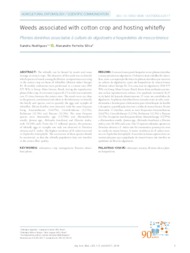Weeds associated with cotton crop and hosting whitefly.
Weeds associated with cotton crop and hosting whitefly.
Author(s): RODRIGUES, S. M. M.; SILVA, A. F. da
Summary: The whitefly can be hosted by weeds and cause damage to cotton crops. The objective of this work was to identify which species of weeds among the floristic compositions occurring in the cotton crop are hosts of whiteflies (Bemisia tabaci biotype B). Bi-weekly evaluations were performed in a cotton area (FM 975 WS) in Sinop, Mato Grosso, Brazil, during the reproductive phase of the crop. An inventory square (0.25 m side) was randomly cast 15 times between the cotton rows. The weeds were cut close to the ground, conditioned and taken to the laboratory to identify the family and species, and to quantify the eggs and nymphs of whiteflies. Eleven families were detected, with the most frequent being Amaranthaceae (16.67%), Convolvulaceae (12.5%), Rubiaceae (12.5%) and Poaceae (12.5%). The most frequent species were Amaranthus spp. (13.79%) and Alternanthera tenella, Ipomea spp., Richardia brasiliensis and Eleusine indica, with 10.34% each. From the 15 collected species, the presence of whitefly eggs or nymphs was only not observed in Portulaca oleracea and E. indica. The highest incidence of B. tabaci occurred in Euphorbia heterophylla. The occurrence of these species should be monitored, so that the whitefly population does not interfere in the cotton fiber quality.
Publication year: 2018
Types of publication: Journal article
Unit: Embrapa Maize & Sorghum
Keywords: Bemisia Tabaci, Infestação, Manejo, Planta Hospedeira, Planta daninha
Observation
Some of Embrapa's publications are published as ePub files. To read them, use or download one of the following free software options to your computer or mobile device. Android: Google Play Books; IOS: iBooks; Windows and Linux: Calibre.
Access other publications
Access the Agricultural Research Database (BDPA) to consult Embrapa's full library collection and records.
Visit Embrapa Bookstore to purchase books and other publications sold by Embrapa.

